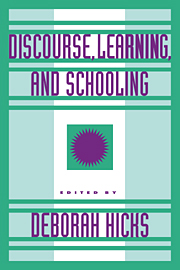Book contents
6 - Selective traditions: readings of Vygotsky in writing pedagogy
Published online by Cambridge University Press: 03 May 2010
Summary
Selective tradition is Raymond Williams's term for the process by which we select from the legacy of the past to explain, support, and justify actions in the present. In his words, it is
an intentionally selective version of a shaping past and a pre-shaped present, which is then powerfully operative in the process of social and cultural definition and identification. … It is a version of the past which is intended to connect with and ratify the present. What it offers in practice is a sense of predisposed continuity.
(1977, pp. 115, 116)Whether conscious or not, selective traditions are influential in societal, professional, and personal life.
I realized this importance anew in discussing the ideas in this chapter with colleagues in South Africa. On the societal level, as an essential contribution to a multi- (or non-)racial South Africa, social scientists are analyzing, challenging, exorcizing, and replacing the selective traditions of Christian Nationalism that have supported apartheid. For example, anthropologists (Boonzaier & Sharp, 1988) have followed Williams in analyzing South African keywords: not only race but also seemingly more benign terms such as culture, ethnicity, and even community.
On a more personal and individual level, a South African colleague explained how she introduces her students to the meaning and importance of critical literacy by showing how autobiographical statements she has written for different audiences select more scholarly or more political aspects of her own career.
- Type
- Chapter
- Information
- Discourse, Learning, and Schooling , pp. 165 - 186Publisher: Cambridge University PressPrint publication year: 1996
- 18
- Cited by



